Quantitative Research Proposal on 'Care for the Caregivers'
VerifiedAdded on 2022/08/16
|18
|5005
|19
Report
AI Summary
This research proposal focuses on the critical issue of caregiver stress and its impact on both the caregivers and the individuals they support. The study aims to investigate the factors contributing to caregiver stress and assess the effectiveness of yoga and meditation practices as a self-care intervention. The objectives include exploring stress-inducing factors, evaluating stress-relieving options, examining the role of yoga and meditation, and providing recommendations for implementing these practices. The proposal includes a comprehensive literature review, highlighting existing research on caregiver burden, mental and physical health outcomes, and the benefits of self-care strategies. The study hypothesizes that yoga and meditation will significantly reduce caregiver stress and improve overall well-being. The research intends to employ a quantitative approach to gather data and analyze the impact of these interventions, with the ultimate goal of informing the development of programs to support caregivers' mental and physical health. The proposal emphasizes the importance of addressing caregiver needs to prevent burnout and ensure effective care provision.
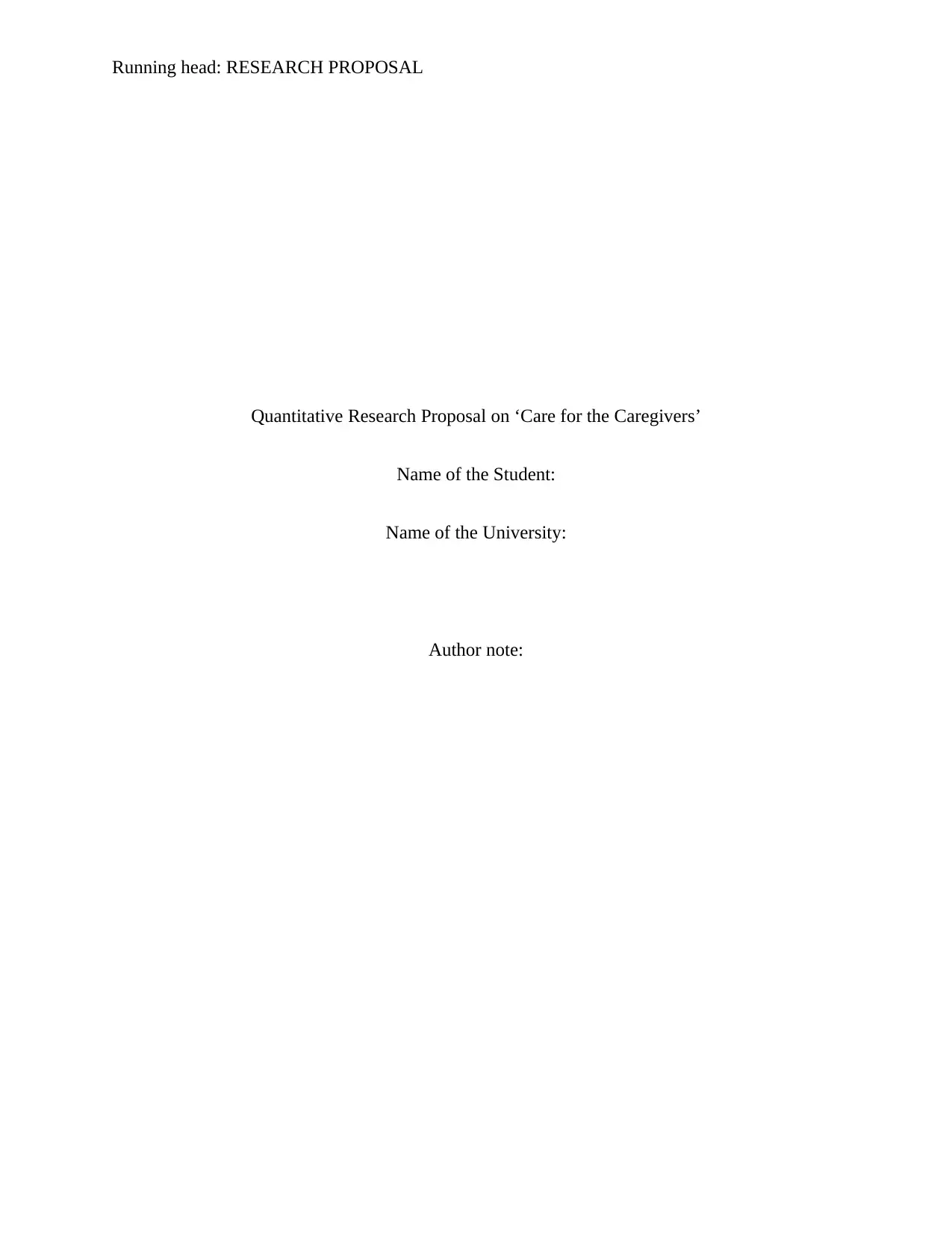
Running head: RESEARCH PROPOSAL
Quantitative Research Proposal on ‘Care for the Caregivers’
Name of the Student:
Name of the University:
Author note:
Quantitative Research Proposal on ‘Care for the Caregivers’
Name of the Student:
Name of the University:
Author note:
Paraphrase This Document
Need a fresh take? Get an instant paraphrase of this document with our AI Paraphraser
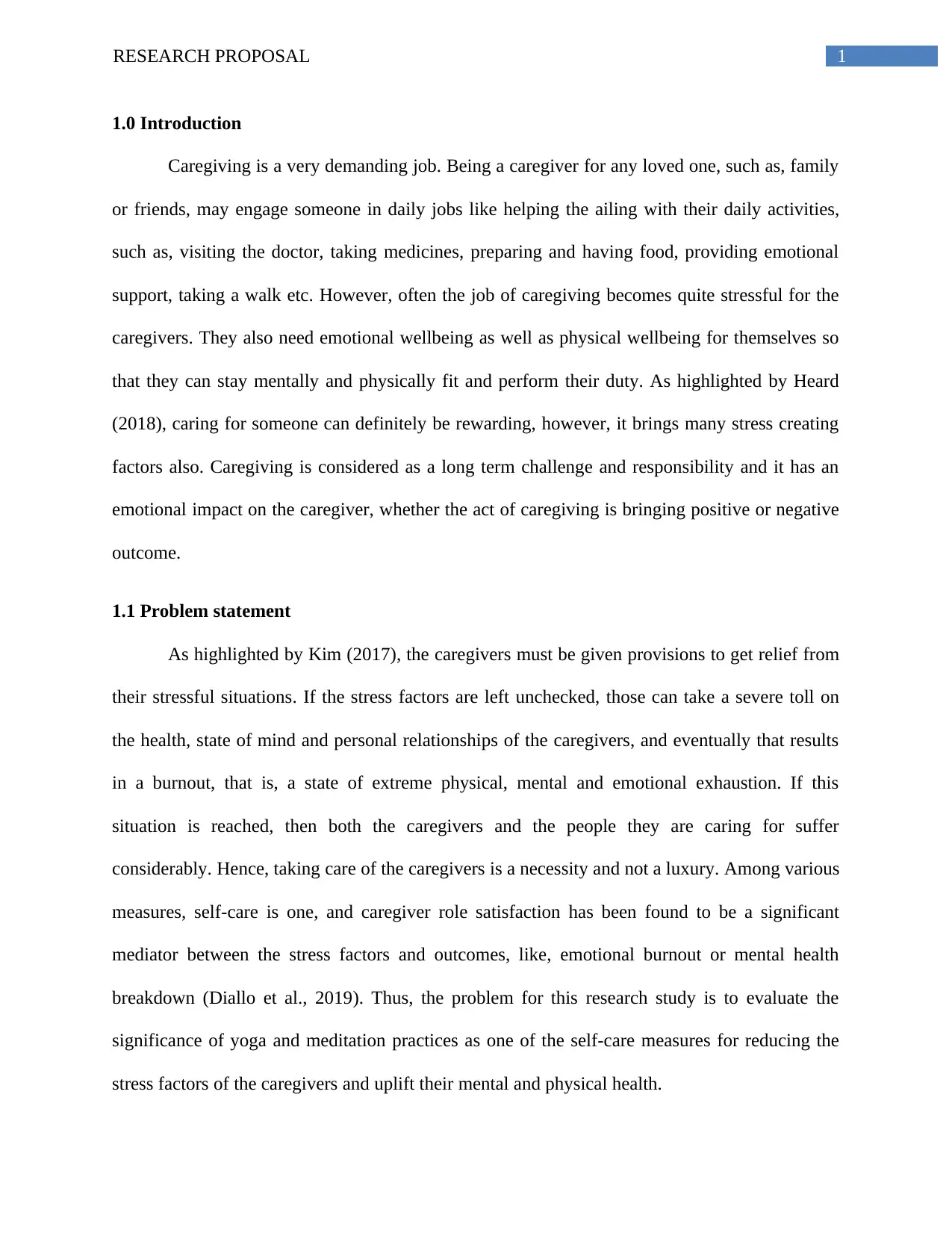
1RESEARCH PROPOSAL
1.0 Introduction
Caregiving is a very demanding job. Being a caregiver for any loved one, such as, family
or friends, may engage someone in daily jobs like helping the ailing with their daily activities,
such as, visiting the doctor, taking medicines, preparing and having food, providing emotional
support, taking a walk etc. However, often the job of caregiving becomes quite stressful for the
caregivers. They also need emotional wellbeing as well as physical wellbeing for themselves so
that they can stay mentally and physically fit and perform their duty. As highlighted by Heard
(2018), caring for someone can definitely be rewarding, however, it brings many stress creating
factors also. Caregiving is considered as a long term challenge and responsibility and it has an
emotional impact on the caregiver, whether the act of caregiving is bringing positive or negative
outcome.
1.1 Problem statement
As highlighted by Kim (2017), the caregivers must be given provisions to get relief from
their stressful situations. If the stress factors are left unchecked, those can take a severe toll on
the health, state of mind and personal relationships of the caregivers, and eventually that results
in a burnout, that is, a state of extreme physical, mental and emotional exhaustion. If this
situation is reached, then both the caregivers and the people they are caring for suffer
considerably. Hence, taking care of the caregivers is a necessity and not a luxury. Among various
measures, self-care is one, and caregiver role satisfaction has been found to be a significant
mediator between the stress factors and outcomes, like, emotional burnout or mental health
breakdown (Diallo et al., 2019). Thus, the problem for this research study is to evaluate the
significance of yoga and meditation practices as one of the self-care measures for reducing the
stress factors of the caregivers and uplift their mental and physical health.
1.0 Introduction
Caregiving is a very demanding job. Being a caregiver for any loved one, such as, family
or friends, may engage someone in daily jobs like helping the ailing with their daily activities,
such as, visiting the doctor, taking medicines, preparing and having food, providing emotional
support, taking a walk etc. However, often the job of caregiving becomes quite stressful for the
caregivers. They also need emotional wellbeing as well as physical wellbeing for themselves so
that they can stay mentally and physically fit and perform their duty. As highlighted by Heard
(2018), caring for someone can definitely be rewarding, however, it brings many stress creating
factors also. Caregiving is considered as a long term challenge and responsibility and it has an
emotional impact on the caregiver, whether the act of caregiving is bringing positive or negative
outcome.
1.1 Problem statement
As highlighted by Kim (2017), the caregivers must be given provisions to get relief from
their stressful situations. If the stress factors are left unchecked, those can take a severe toll on
the health, state of mind and personal relationships of the caregivers, and eventually that results
in a burnout, that is, a state of extreme physical, mental and emotional exhaustion. If this
situation is reached, then both the caregivers and the people they are caring for suffer
considerably. Hence, taking care of the caregivers is a necessity and not a luxury. Among various
measures, self-care is one, and caregiver role satisfaction has been found to be a significant
mediator between the stress factors and outcomes, like, emotional burnout or mental health
breakdown (Diallo et al., 2019). Thus, the problem for this research study is to evaluate the
significance of yoga and meditation practices as one of the self-care measures for reducing the
stress factors of the caregivers and uplift their mental and physical health.
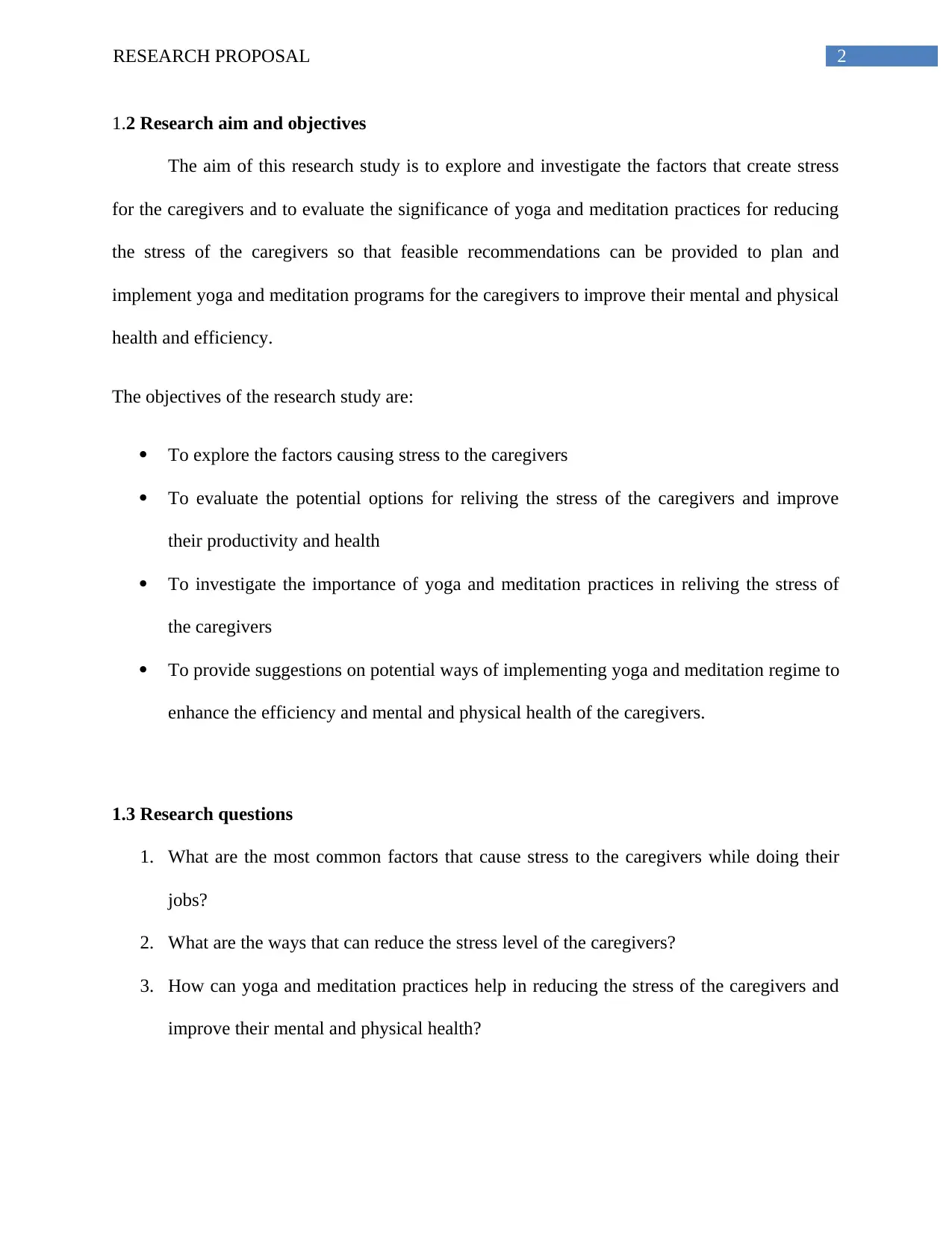
2RESEARCH PROPOSAL
1.2 Research aim and objectives
The aim of this research study is to explore and investigate the factors that create stress
for the caregivers and to evaluate the significance of yoga and meditation practices for reducing
the stress of the caregivers so that feasible recommendations can be provided to plan and
implement yoga and meditation programs for the caregivers to improve their mental and physical
health and efficiency.
The objectives of the research study are:
To explore the factors causing stress to the caregivers
To evaluate the potential options for reliving the stress of the caregivers and improve
their productivity and health
To investigate the importance of yoga and meditation practices in reliving the stress of
the caregivers
To provide suggestions on potential ways of implementing yoga and meditation regime to
enhance the efficiency and mental and physical health of the caregivers.
1.3 Research questions
1. What are the most common factors that cause stress to the caregivers while doing their
jobs?
2. What are the ways that can reduce the stress level of the caregivers?
3. How can yoga and meditation practices help in reducing the stress of the caregivers and
improve their mental and physical health?
1.2 Research aim and objectives
The aim of this research study is to explore and investigate the factors that create stress
for the caregivers and to evaluate the significance of yoga and meditation practices for reducing
the stress of the caregivers so that feasible recommendations can be provided to plan and
implement yoga and meditation programs for the caregivers to improve their mental and physical
health and efficiency.
The objectives of the research study are:
To explore the factors causing stress to the caregivers
To evaluate the potential options for reliving the stress of the caregivers and improve
their productivity and health
To investigate the importance of yoga and meditation practices in reliving the stress of
the caregivers
To provide suggestions on potential ways of implementing yoga and meditation regime to
enhance the efficiency and mental and physical health of the caregivers.
1.3 Research questions
1. What are the most common factors that cause stress to the caregivers while doing their
jobs?
2. What are the ways that can reduce the stress level of the caregivers?
3. How can yoga and meditation practices help in reducing the stress of the caregivers and
improve their mental and physical health?
⊘ This is a preview!⊘
Do you want full access?
Subscribe today to unlock all pages.

Trusted by 1+ million students worldwide
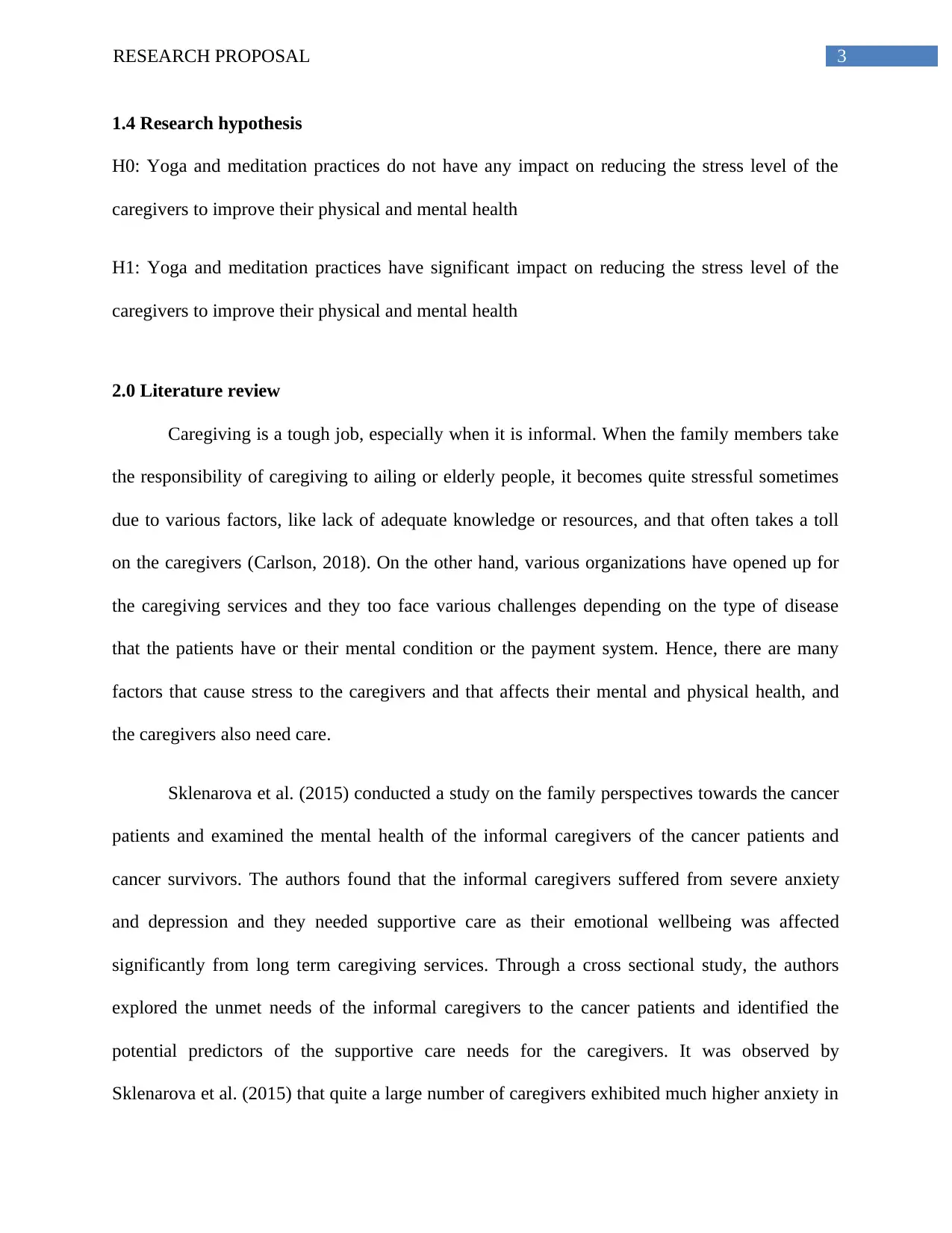
3RESEARCH PROPOSAL
1.4 Research hypothesis
H0: Yoga and meditation practices do not have any impact on reducing the stress level of the
caregivers to improve their physical and mental health
H1: Yoga and meditation practices have significant impact on reducing the stress level of the
caregivers to improve their physical and mental health
2.0 Literature review
Caregiving is a tough job, especially when it is informal. When the family members take
the responsibility of caregiving to ailing or elderly people, it becomes quite stressful sometimes
due to various factors, like lack of adequate knowledge or resources, and that often takes a toll
on the caregivers (Carlson, 2018). On the other hand, various organizations have opened up for
the caregiving services and they too face various challenges depending on the type of disease
that the patients have or their mental condition or the payment system. Hence, there are many
factors that cause stress to the caregivers and that affects their mental and physical health, and
the caregivers also need care.
Sklenarova et al. (2015) conducted a study on the family perspectives towards the cancer
patients and examined the mental health of the informal caregivers of the cancer patients and
cancer survivors. The authors found that the informal caregivers suffered from severe anxiety
and depression and they needed supportive care as their emotional wellbeing was affected
significantly from long term caregiving services. Through a cross sectional study, the authors
explored the unmet needs of the informal caregivers to the cancer patients and identified the
potential predictors of the supportive care needs for the caregivers. It was observed by
Sklenarova et al. (2015) that quite a large number of caregivers exhibited much higher anxiety in
1.4 Research hypothesis
H0: Yoga and meditation practices do not have any impact on reducing the stress level of the
caregivers to improve their physical and mental health
H1: Yoga and meditation practices have significant impact on reducing the stress level of the
caregivers to improve their physical and mental health
2.0 Literature review
Caregiving is a tough job, especially when it is informal. When the family members take
the responsibility of caregiving to ailing or elderly people, it becomes quite stressful sometimes
due to various factors, like lack of adequate knowledge or resources, and that often takes a toll
on the caregivers (Carlson, 2018). On the other hand, various organizations have opened up for
the caregiving services and they too face various challenges depending on the type of disease
that the patients have or their mental condition or the payment system. Hence, there are many
factors that cause stress to the caregivers and that affects their mental and physical health, and
the caregivers also need care.
Sklenarova et al. (2015) conducted a study on the family perspectives towards the cancer
patients and examined the mental health of the informal caregivers of the cancer patients and
cancer survivors. The authors found that the informal caregivers suffered from severe anxiety
and depression and they needed supportive care as their emotional wellbeing was affected
significantly from long term caregiving services. Through a cross sectional study, the authors
explored the unmet needs of the informal caregivers to the cancer patients and identified the
potential predictors of the supportive care needs for the caregivers. It was observed by
Sklenarova et al. (2015) that quite a large number of caregivers exhibited much higher anxiety in
Paraphrase This Document
Need a fresh take? Get an instant paraphrase of this document with our AI Paraphraser
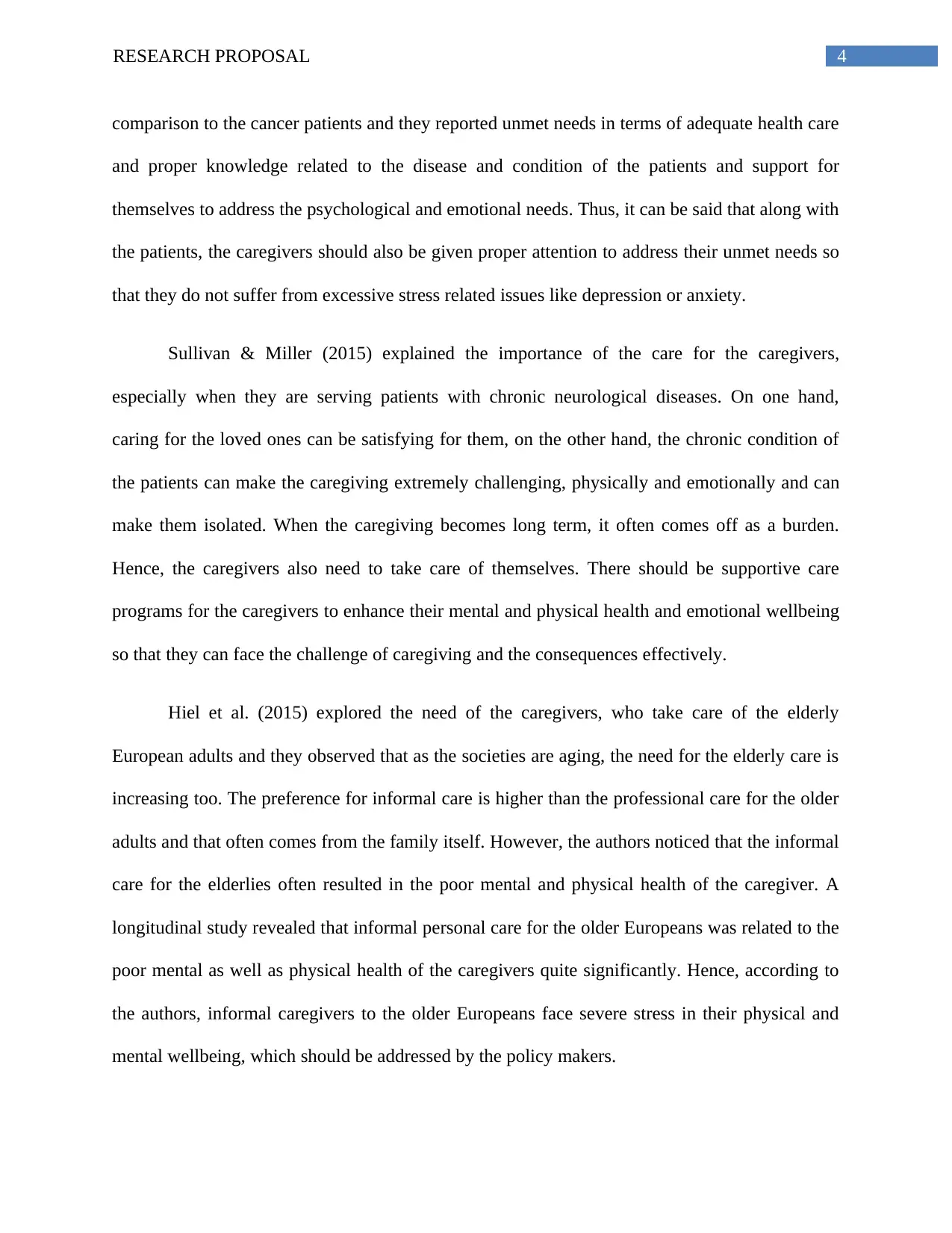
4RESEARCH PROPOSAL
comparison to the cancer patients and they reported unmet needs in terms of adequate health care
and proper knowledge related to the disease and condition of the patients and support for
themselves to address the psychological and emotional needs. Thus, it can be said that along with
the patients, the caregivers should also be given proper attention to address their unmet needs so
that they do not suffer from excessive stress related issues like depression or anxiety.
Sullivan & Miller (2015) explained the importance of the care for the caregivers,
especially when they are serving patients with chronic neurological diseases. On one hand,
caring for the loved ones can be satisfying for them, on the other hand, the chronic condition of
the patients can make the caregiving extremely challenging, physically and emotionally and can
make them isolated. When the caregiving becomes long term, it often comes off as a burden.
Hence, the caregivers also need to take care of themselves. There should be supportive care
programs for the caregivers to enhance their mental and physical health and emotional wellbeing
so that they can face the challenge of caregiving and the consequences effectively.
Hiel et al. (2015) explored the need of the caregivers, who take care of the elderly
European adults and they observed that as the societies are aging, the need for the elderly care is
increasing too. The preference for informal care is higher than the professional care for the older
adults and that often comes from the family itself. However, the authors noticed that the informal
care for the elderlies often resulted in the poor mental and physical health of the caregiver. A
longitudinal study revealed that informal personal care for the older Europeans was related to the
poor mental as well as physical health of the caregivers quite significantly. Hence, according to
the authors, informal caregivers to the older Europeans face severe stress in their physical and
mental wellbeing, which should be addressed by the policy makers.
comparison to the cancer patients and they reported unmet needs in terms of adequate health care
and proper knowledge related to the disease and condition of the patients and support for
themselves to address the psychological and emotional needs. Thus, it can be said that along with
the patients, the caregivers should also be given proper attention to address their unmet needs so
that they do not suffer from excessive stress related issues like depression or anxiety.
Sullivan & Miller (2015) explained the importance of the care for the caregivers,
especially when they are serving patients with chronic neurological diseases. On one hand,
caring for the loved ones can be satisfying for them, on the other hand, the chronic condition of
the patients can make the caregiving extremely challenging, physically and emotionally and can
make them isolated. When the caregiving becomes long term, it often comes off as a burden.
Hence, the caregivers also need to take care of themselves. There should be supportive care
programs for the caregivers to enhance their mental and physical health and emotional wellbeing
so that they can face the challenge of caregiving and the consequences effectively.
Hiel et al. (2015) explored the need of the caregivers, who take care of the elderly
European adults and they observed that as the societies are aging, the need for the elderly care is
increasing too. The preference for informal care is higher than the professional care for the older
adults and that often comes from the family itself. However, the authors noticed that the informal
care for the elderlies often resulted in the poor mental and physical health of the caregiver. A
longitudinal study revealed that informal personal care for the older Europeans was related to the
poor mental as well as physical health of the caregivers quite significantly. Hence, according to
the authors, informal caregivers to the older Europeans face severe stress in their physical and
mental wellbeing, which should be addressed by the policy makers.
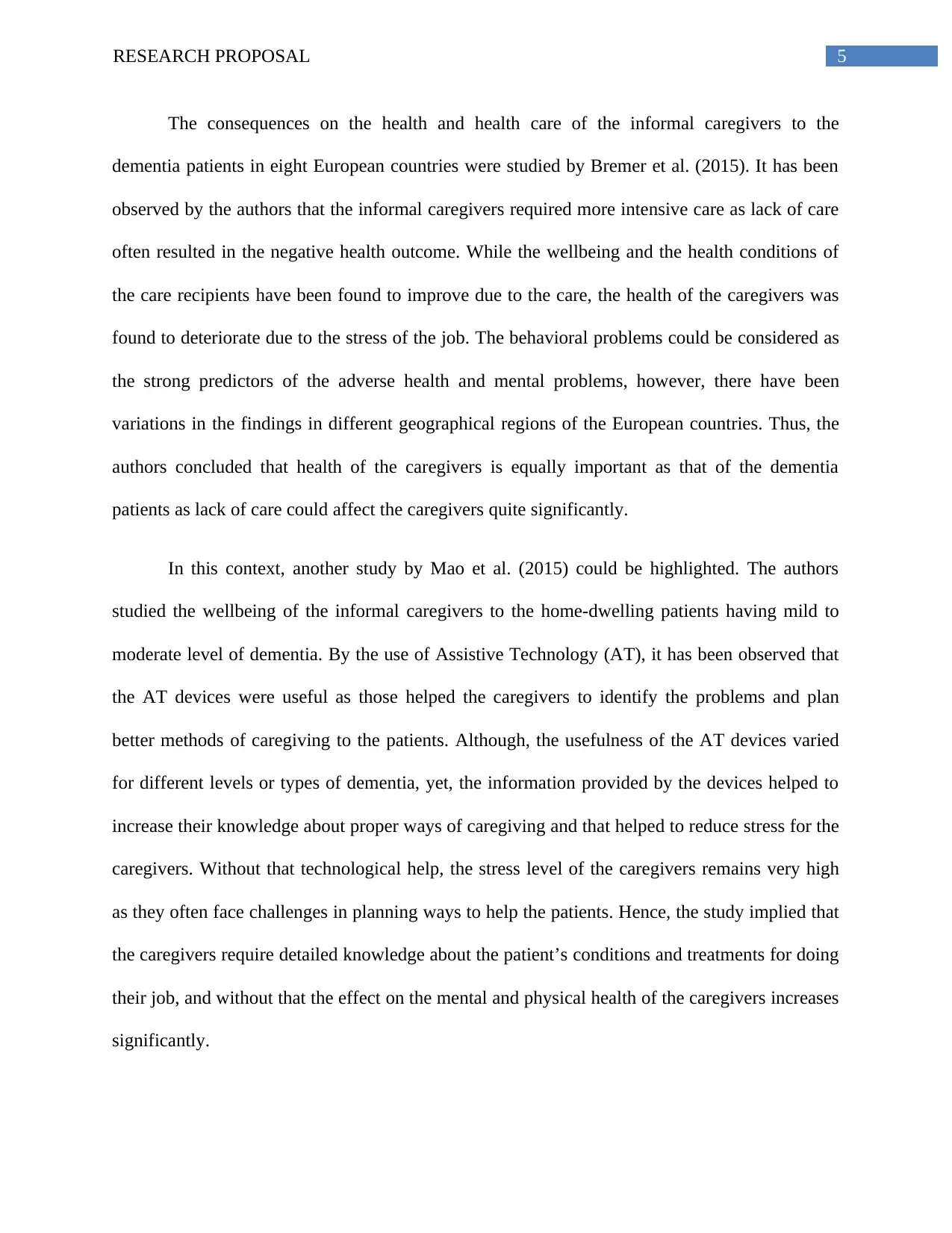
5RESEARCH PROPOSAL
The consequences on the health and health care of the informal caregivers to the
dementia patients in eight European countries were studied by Bremer et al. (2015). It has been
observed by the authors that the informal caregivers required more intensive care as lack of care
often resulted in the negative health outcome. While the wellbeing and the health conditions of
the care recipients have been found to improve due to the care, the health of the caregivers was
found to deteriorate due to the stress of the job. The behavioral problems could be considered as
the strong predictors of the adverse health and mental problems, however, there have been
variations in the findings in different geographical regions of the European countries. Thus, the
authors concluded that health of the caregivers is equally important as that of the dementia
patients as lack of care could affect the caregivers quite significantly.
In this context, another study by Mao et al. (2015) could be highlighted. The authors
studied the wellbeing of the informal caregivers to the home-dwelling patients having mild to
moderate level of dementia. By the use of Assistive Technology (AT), it has been observed that
the AT devices were useful as those helped the caregivers to identify the problems and plan
better methods of caregiving to the patients. Although, the usefulness of the AT devices varied
for different levels or types of dementia, yet, the information provided by the devices helped to
increase their knowledge about proper ways of caregiving and that helped to reduce stress for the
caregivers. Without that technological help, the stress level of the caregivers remains very high
as they often face challenges in planning ways to help the patients. Hence, the study implied that
the caregivers require detailed knowledge about the patient’s conditions and treatments for doing
their job, and without that the effect on the mental and physical health of the caregivers increases
significantly.
The consequences on the health and health care of the informal caregivers to the
dementia patients in eight European countries were studied by Bremer et al. (2015). It has been
observed by the authors that the informal caregivers required more intensive care as lack of care
often resulted in the negative health outcome. While the wellbeing and the health conditions of
the care recipients have been found to improve due to the care, the health of the caregivers was
found to deteriorate due to the stress of the job. The behavioral problems could be considered as
the strong predictors of the adverse health and mental problems, however, there have been
variations in the findings in different geographical regions of the European countries. Thus, the
authors concluded that health of the caregivers is equally important as that of the dementia
patients as lack of care could affect the caregivers quite significantly.
In this context, another study by Mao et al. (2015) could be highlighted. The authors
studied the wellbeing of the informal caregivers to the home-dwelling patients having mild to
moderate level of dementia. By the use of Assistive Technology (AT), it has been observed that
the AT devices were useful as those helped the caregivers to identify the problems and plan
better methods of caregiving to the patients. Although, the usefulness of the AT devices varied
for different levels or types of dementia, yet, the information provided by the devices helped to
increase their knowledge about proper ways of caregiving and that helped to reduce stress for the
caregivers. Without that technological help, the stress level of the caregivers remains very high
as they often face challenges in planning ways to help the patients. Hence, the study implied that
the caregivers require detailed knowledge about the patient’s conditions and treatments for doing
their job, and without that the effect on the mental and physical health of the caregivers increases
significantly.
⊘ This is a preview!⊘
Do you want full access?
Subscribe today to unlock all pages.

Trusted by 1+ million students worldwide
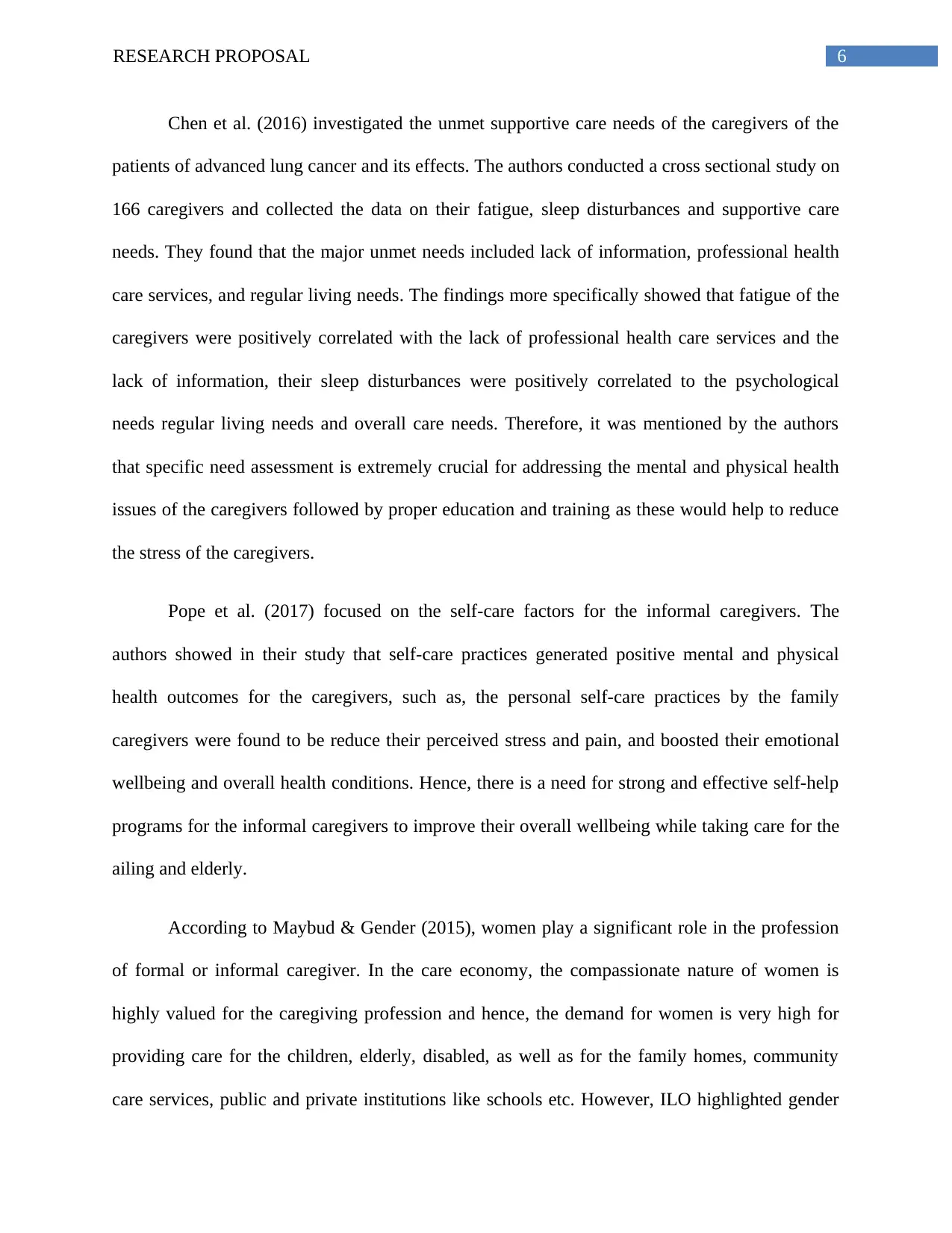
6RESEARCH PROPOSAL
Chen et al. (2016) investigated the unmet supportive care needs of the caregivers of the
patients of advanced lung cancer and its effects. The authors conducted a cross sectional study on
166 caregivers and collected the data on their fatigue, sleep disturbances and supportive care
needs. They found that the major unmet needs included lack of information, professional health
care services, and regular living needs. The findings more specifically showed that fatigue of the
caregivers were positively correlated with the lack of professional health care services and the
lack of information, their sleep disturbances were positively correlated to the psychological
needs regular living needs and overall care needs. Therefore, it was mentioned by the authors
that specific need assessment is extremely crucial for addressing the mental and physical health
issues of the caregivers followed by proper education and training as these would help to reduce
the stress of the caregivers.
Pope et al. (2017) focused on the self-care factors for the informal caregivers. The
authors showed in their study that self-care practices generated positive mental and physical
health outcomes for the caregivers, such as, the personal self-care practices by the family
caregivers were found to be reduce their perceived stress and pain, and boosted their emotional
wellbeing and overall health conditions. Hence, there is a need for strong and effective self-help
programs for the informal caregivers to improve their overall wellbeing while taking care for the
ailing and elderly.
According to Maybud & Gender (2015), women play a significant role in the profession
of formal or informal caregiver. In the care economy, the compassionate nature of women is
highly valued for the caregiving profession and hence, the demand for women is very high for
providing care for the children, elderly, disabled, as well as for the family homes, community
care services, public and private institutions like schools etc. However, ILO highlighted gender
Chen et al. (2016) investigated the unmet supportive care needs of the caregivers of the
patients of advanced lung cancer and its effects. The authors conducted a cross sectional study on
166 caregivers and collected the data on their fatigue, sleep disturbances and supportive care
needs. They found that the major unmet needs included lack of information, professional health
care services, and regular living needs. The findings more specifically showed that fatigue of the
caregivers were positively correlated with the lack of professional health care services and the
lack of information, their sleep disturbances were positively correlated to the psychological
needs regular living needs and overall care needs. Therefore, it was mentioned by the authors
that specific need assessment is extremely crucial for addressing the mental and physical health
issues of the caregivers followed by proper education and training as these would help to reduce
the stress of the caregivers.
Pope et al. (2017) focused on the self-care factors for the informal caregivers. The
authors showed in their study that self-care practices generated positive mental and physical
health outcomes for the caregivers, such as, the personal self-care practices by the family
caregivers were found to be reduce their perceived stress and pain, and boosted their emotional
wellbeing and overall health conditions. Hence, there is a need for strong and effective self-help
programs for the informal caregivers to improve their overall wellbeing while taking care for the
ailing and elderly.
According to Maybud & Gender (2015), women play a significant role in the profession
of formal or informal caregiver. In the care economy, the compassionate nature of women is
highly valued for the caregiving profession and hence, the demand for women is very high for
providing care for the children, elderly, disabled, as well as for the family homes, community
care services, public and private institutions like schools etc. However, ILO highlighted gender
Paraphrase This Document
Need a fresh take? Get an instant paraphrase of this document with our AI Paraphraser
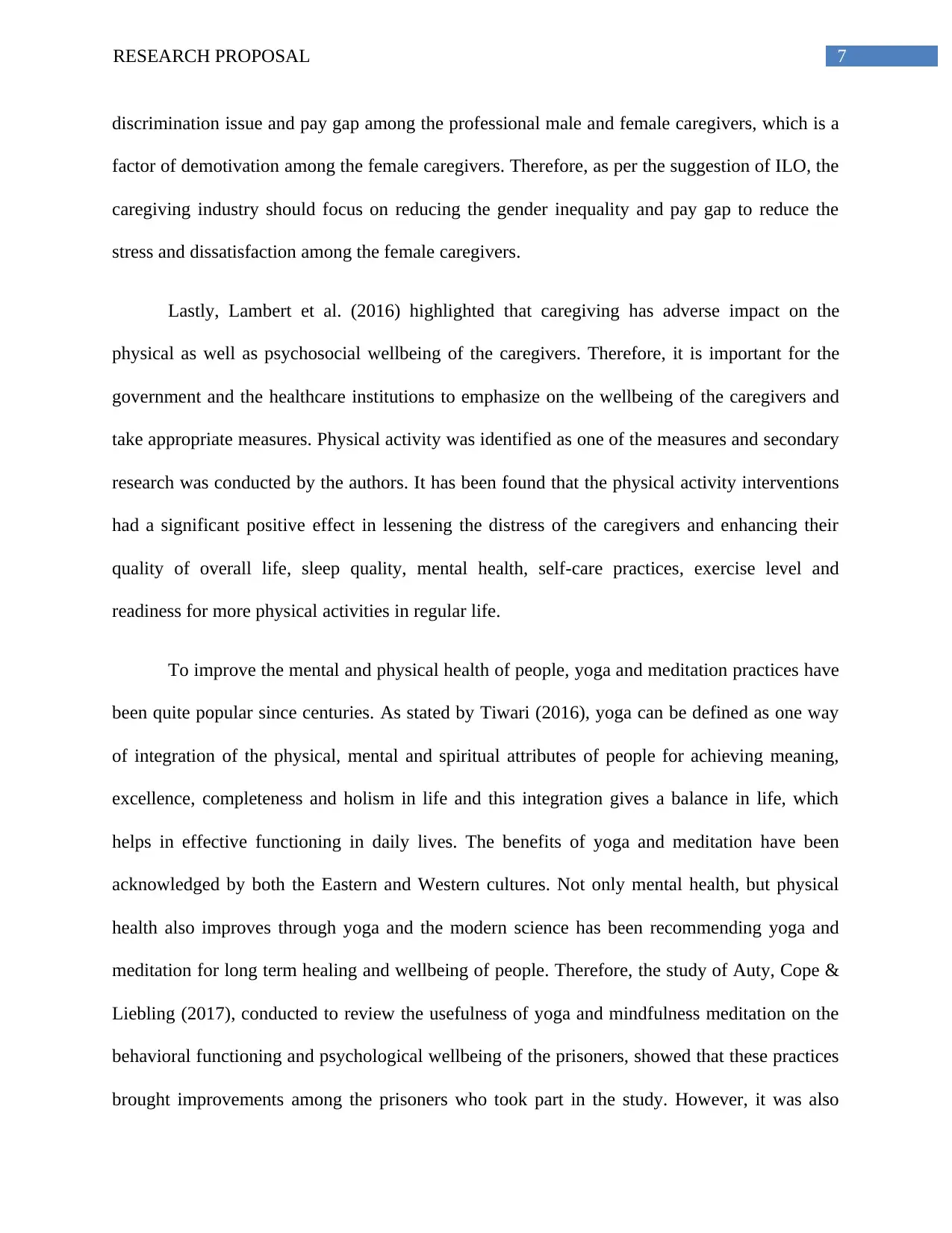
7RESEARCH PROPOSAL
discrimination issue and pay gap among the professional male and female caregivers, which is a
factor of demotivation among the female caregivers. Therefore, as per the suggestion of ILO, the
caregiving industry should focus on reducing the gender inequality and pay gap to reduce the
stress and dissatisfaction among the female caregivers.
Lastly, Lambert et al. (2016) highlighted that caregiving has adverse impact on the
physical as well as psychosocial wellbeing of the caregivers. Therefore, it is important for the
government and the healthcare institutions to emphasize on the wellbeing of the caregivers and
take appropriate measures. Physical activity was identified as one of the measures and secondary
research was conducted by the authors. It has been found that the physical activity interventions
had a significant positive effect in lessening the distress of the caregivers and enhancing their
quality of overall life, sleep quality, mental health, self-care practices, exercise level and
readiness for more physical activities in regular life.
To improve the mental and physical health of people, yoga and meditation practices have
been quite popular since centuries. As stated by Tiwari (2016), yoga can be defined as one way
of integration of the physical, mental and spiritual attributes of people for achieving meaning,
excellence, completeness and holism in life and this integration gives a balance in life, which
helps in effective functioning in daily lives. The benefits of yoga and meditation have been
acknowledged by both the Eastern and Western cultures. Not only mental health, but physical
health also improves through yoga and the modern science has been recommending yoga and
meditation for long term healing and wellbeing of people. Therefore, the study of Auty, Cope &
Liebling (2017), conducted to review the usefulness of yoga and mindfulness meditation on the
behavioral functioning and psychological wellbeing of the prisoners, showed that these practices
brought improvements among the prisoners who took part in the study. However, it was also
discrimination issue and pay gap among the professional male and female caregivers, which is a
factor of demotivation among the female caregivers. Therefore, as per the suggestion of ILO, the
caregiving industry should focus on reducing the gender inequality and pay gap to reduce the
stress and dissatisfaction among the female caregivers.
Lastly, Lambert et al. (2016) highlighted that caregiving has adverse impact on the
physical as well as psychosocial wellbeing of the caregivers. Therefore, it is important for the
government and the healthcare institutions to emphasize on the wellbeing of the caregivers and
take appropriate measures. Physical activity was identified as one of the measures and secondary
research was conducted by the authors. It has been found that the physical activity interventions
had a significant positive effect in lessening the distress of the caregivers and enhancing their
quality of overall life, sleep quality, mental health, self-care practices, exercise level and
readiness for more physical activities in regular life.
To improve the mental and physical health of people, yoga and meditation practices have
been quite popular since centuries. As stated by Tiwari (2016), yoga can be defined as one way
of integration of the physical, mental and spiritual attributes of people for achieving meaning,
excellence, completeness and holism in life and this integration gives a balance in life, which
helps in effective functioning in daily lives. The benefits of yoga and meditation have been
acknowledged by both the Eastern and Western cultures. Not only mental health, but physical
health also improves through yoga and the modern science has been recommending yoga and
meditation for long term healing and wellbeing of people. Therefore, the study of Auty, Cope &
Liebling (2017), conducted to review the usefulness of yoga and mindfulness meditation on the
behavioral functioning and psychological wellbeing of the prisoners, showed that these practices
brought improvements among the prisoners who took part in the study. However, it was also
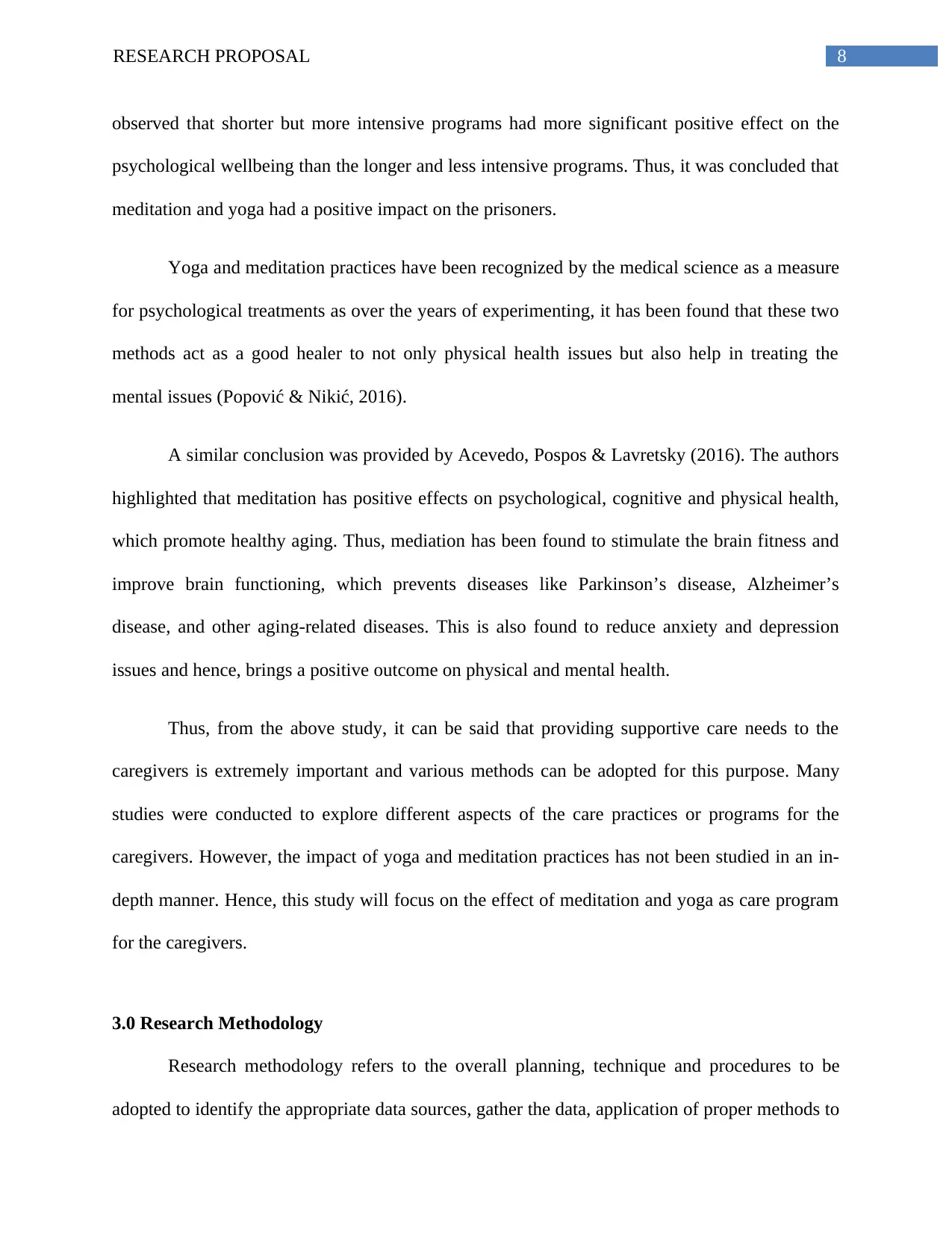
8RESEARCH PROPOSAL
observed that shorter but more intensive programs had more significant positive effect on the
psychological wellbeing than the longer and less intensive programs. Thus, it was concluded that
meditation and yoga had a positive impact on the prisoners.
Yoga and meditation practices have been recognized by the medical science as a measure
for psychological treatments as over the years of experimenting, it has been found that these two
methods act as a good healer to not only physical health issues but also help in treating the
mental issues (Popović & Nikić, 2016).
A similar conclusion was provided by Acevedo, Pospos & Lavretsky (2016). The authors
highlighted that meditation has positive effects on psychological, cognitive and physical health,
which promote healthy aging. Thus, mediation has been found to stimulate the brain fitness and
improve brain functioning, which prevents diseases like Parkinson’s disease, Alzheimer’s
disease, and other aging-related diseases. This is also found to reduce anxiety and depression
issues and hence, brings a positive outcome on physical and mental health.
Thus, from the above study, it can be said that providing supportive care needs to the
caregivers is extremely important and various methods can be adopted for this purpose. Many
studies were conducted to explore different aspects of the care practices or programs for the
caregivers. However, the impact of yoga and meditation practices has not been studied in an in-
depth manner. Hence, this study will focus on the effect of meditation and yoga as care program
for the caregivers.
3.0 Research Methodology
Research methodology refers to the overall planning, technique and procedures to be
adopted to identify the appropriate data sources, gather the data, application of proper methods to
observed that shorter but more intensive programs had more significant positive effect on the
psychological wellbeing than the longer and less intensive programs. Thus, it was concluded that
meditation and yoga had a positive impact on the prisoners.
Yoga and meditation practices have been recognized by the medical science as a measure
for psychological treatments as over the years of experimenting, it has been found that these two
methods act as a good healer to not only physical health issues but also help in treating the
mental issues (Popović & Nikić, 2016).
A similar conclusion was provided by Acevedo, Pospos & Lavretsky (2016). The authors
highlighted that meditation has positive effects on psychological, cognitive and physical health,
which promote healthy aging. Thus, mediation has been found to stimulate the brain fitness and
improve brain functioning, which prevents diseases like Parkinson’s disease, Alzheimer’s
disease, and other aging-related diseases. This is also found to reduce anxiety and depression
issues and hence, brings a positive outcome on physical and mental health.
Thus, from the above study, it can be said that providing supportive care needs to the
caregivers is extremely important and various methods can be adopted for this purpose. Many
studies were conducted to explore different aspects of the care practices or programs for the
caregivers. However, the impact of yoga and meditation practices has not been studied in an in-
depth manner. Hence, this study will focus on the effect of meditation and yoga as care program
for the caregivers.
3.0 Research Methodology
Research methodology refers to the overall planning, technique and procedures to be
adopted to identify the appropriate data sources, gather the data, application of proper methods to
⊘ This is a preview!⊘
Do you want full access?
Subscribe today to unlock all pages.

Trusted by 1+ million students worldwide
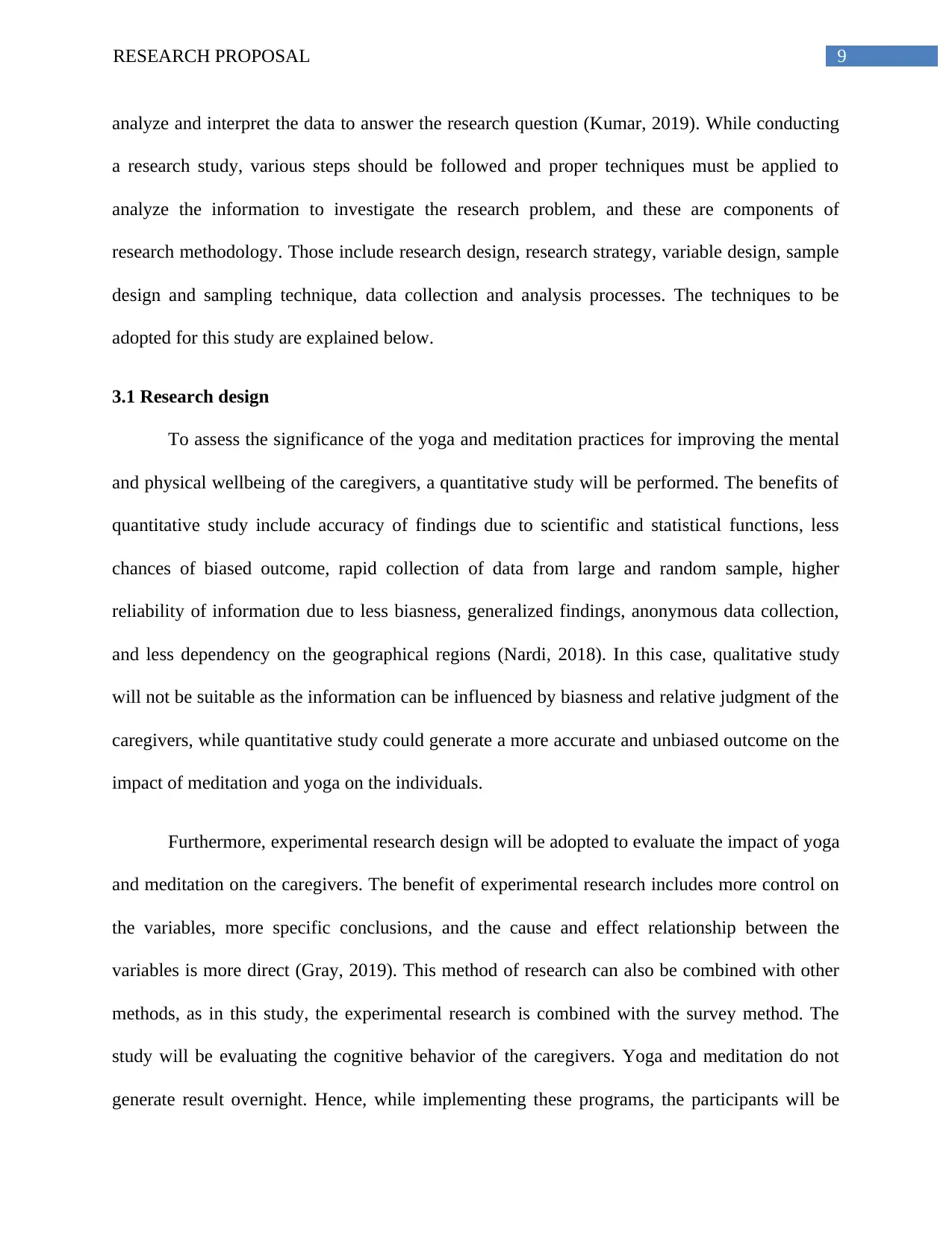
9RESEARCH PROPOSAL
analyze and interpret the data to answer the research question (Kumar, 2019). While conducting
a research study, various steps should be followed and proper techniques must be applied to
analyze the information to investigate the research problem, and these are components of
research methodology. Those include research design, research strategy, variable design, sample
design and sampling technique, data collection and analysis processes. The techniques to be
adopted for this study are explained below.
3.1 Research design
To assess the significance of the yoga and meditation practices for improving the mental
and physical wellbeing of the caregivers, a quantitative study will be performed. The benefits of
quantitative study include accuracy of findings due to scientific and statistical functions, less
chances of biased outcome, rapid collection of data from large and random sample, higher
reliability of information due to less biasness, generalized findings, anonymous data collection,
and less dependency on the geographical regions (Nardi, 2018). In this case, qualitative study
will not be suitable as the information can be influenced by biasness and relative judgment of the
caregivers, while quantitative study could generate a more accurate and unbiased outcome on the
impact of meditation and yoga on the individuals.
Furthermore, experimental research design will be adopted to evaluate the impact of yoga
and meditation on the caregivers. The benefit of experimental research includes more control on
the variables, more specific conclusions, and the cause and effect relationship between the
variables is more direct (Gray, 2019). This method of research can also be combined with other
methods, as in this study, the experimental research is combined with the survey method. The
study will be evaluating the cognitive behavior of the caregivers. Yoga and meditation do not
generate result overnight. Hence, while implementing these programs, the participants will be
analyze and interpret the data to answer the research question (Kumar, 2019). While conducting
a research study, various steps should be followed and proper techniques must be applied to
analyze the information to investigate the research problem, and these are components of
research methodology. Those include research design, research strategy, variable design, sample
design and sampling technique, data collection and analysis processes. The techniques to be
adopted for this study are explained below.
3.1 Research design
To assess the significance of the yoga and meditation practices for improving the mental
and physical wellbeing of the caregivers, a quantitative study will be performed. The benefits of
quantitative study include accuracy of findings due to scientific and statistical functions, less
chances of biased outcome, rapid collection of data from large and random sample, higher
reliability of information due to less biasness, generalized findings, anonymous data collection,
and less dependency on the geographical regions (Nardi, 2018). In this case, qualitative study
will not be suitable as the information can be influenced by biasness and relative judgment of the
caregivers, while quantitative study could generate a more accurate and unbiased outcome on the
impact of meditation and yoga on the individuals.
Furthermore, experimental research design will be adopted to evaluate the impact of yoga
and meditation on the caregivers. The benefit of experimental research includes more control on
the variables, more specific conclusions, and the cause and effect relationship between the
variables is more direct (Gray, 2019). This method of research can also be combined with other
methods, as in this study, the experimental research is combined with the survey method. The
study will be evaluating the cognitive behavior of the caregivers. Yoga and meditation do not
generate result overnight. Hence, while implementing these programs, the participants will be
Paraphrase This Document
Need a fresh take? Get an instant paraphrase of this document with our AI Paraphraser
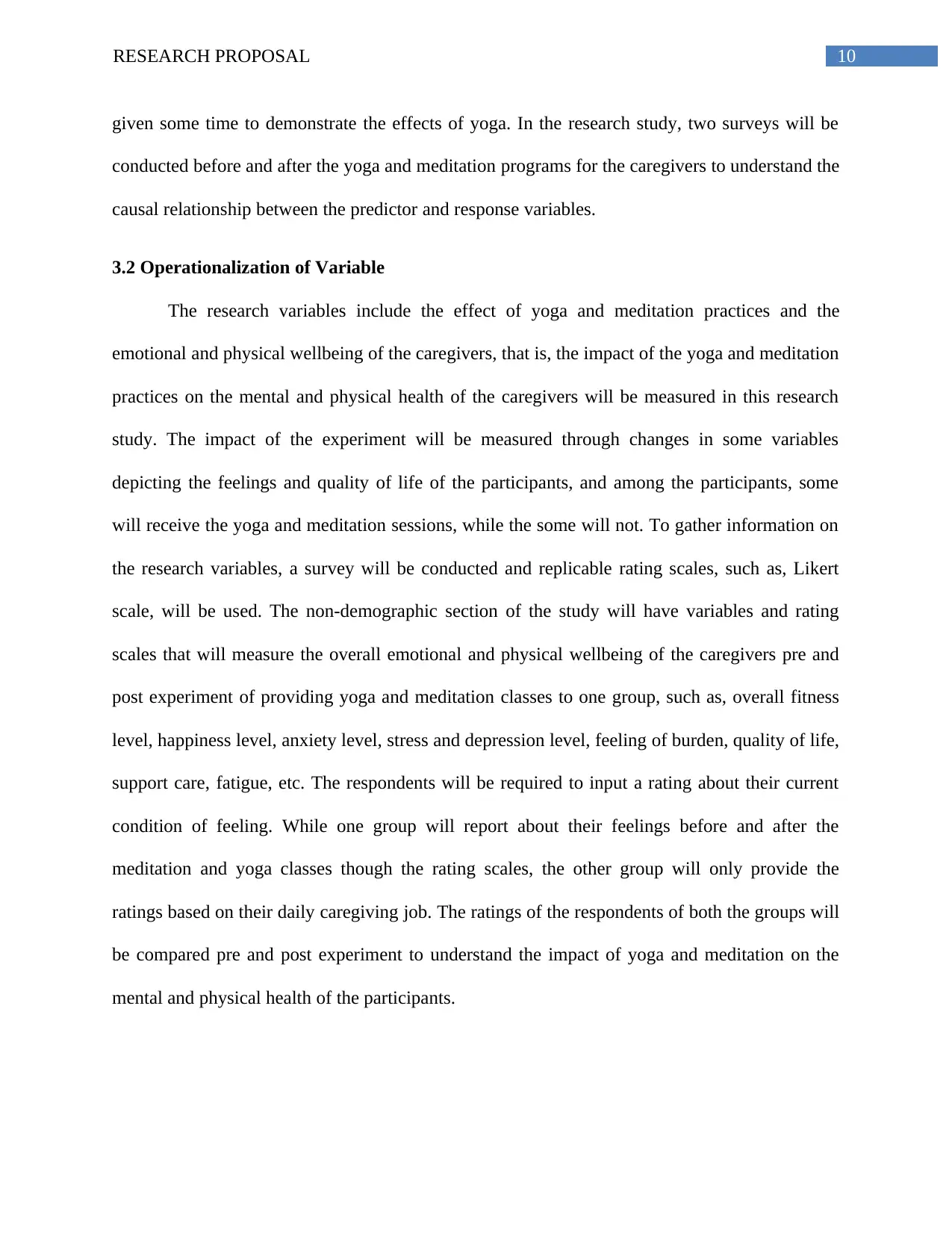
10RESEARCH PROPOSAL
given some time to demonstrate the effects of yoga. In the research study, two surveys will be
conducted before and after the yoga and meditation programs for the caregivers to understand the
causal relationship between the predictor and response variables.
3.2 Operationalization of Variable
The research variables include the effect of yoga and meditation practices and the
emotional and physical wellbeing of the caregivers, that is, the impact of the yoga and meditation
practices on the mental and physical health of the caregivers will be measured in this research
study. The impact of the experiment will be measured through changes in some variables
depicting the feelings and quality of life of the participants, and among the participants, some
will receive the yoga and meditation sessions, while the some will not. To gather information on
the research variables, a survey will be conducted and replicable rating scales, such as, Likert
scale, will be used. The non-demographic section of the study will have variables and rating
scales that will measure the overall emotional and physical wellbeing of the caregivers pre and
post experiment of providing yoga and meditation classes to one group, such as, overall fitness
level, happiness level, anxiety level, stress and depression level, feeling of burden, quality of life,
support care, fatigue, etc. The respondents will be required to input a rating about their current
condition of feeling. While one group will report about their feelings before and after the
meditation and yoga classes though the rating scales, the other group will only provide the
ratings based on their daily caregiving job. The ratings of the respondents of both the groups will
be compared pre and post experiment to understand the impact of yoga and meditation on the
mental and physical health of the participants.
given some time to demonstrate the effects of yoga. In the research study, two surveys will be
conducted before and after the yoga and meditation programs for the caregivers to understand the
causal relationship between the predictor and response variables.
3.2 Operationalization of Variable
The research variables include the effect of yoga and meditation practices and the
emotional and physical wellbeing of the caregivers, that is, the impact of the yoga and meditation
practices on the mental and physical health of the caregivers will be measured in this research
study. The impact of the experiment will be measured through changes in some variables
depicting the feelings and quality of life of the participants, and among the participants, some
will receive the yoga and meditation sessions, while the some will not. To gather information on
the research variables, a survey will be conducted and replicable rating scales, such as, Likert
scale, will be used. The non-demographic section of the study will have variables and rating
scales that will measure the overall emotional and physical wellbeing of the caregivers pre and
post experiment of providing yoga and meditation classes to one group, such as, overall fitness
level, happiness level, anxiety level, stress and depression level, feeling of burden, quality of life,
support care, fatigue, etc. The respondents will be required to input a rating about their current
condition of feeling. While one group will report about their feelings before and after the
meditation and yoga classes though the rating scales, the other group will only provide the
ratings based on their daily caregiving job. The ratings of the respondents of both the groups will
be compared pre and post experiment to understand the impact of yoga and meditation on the
mental and physical health of the participants.
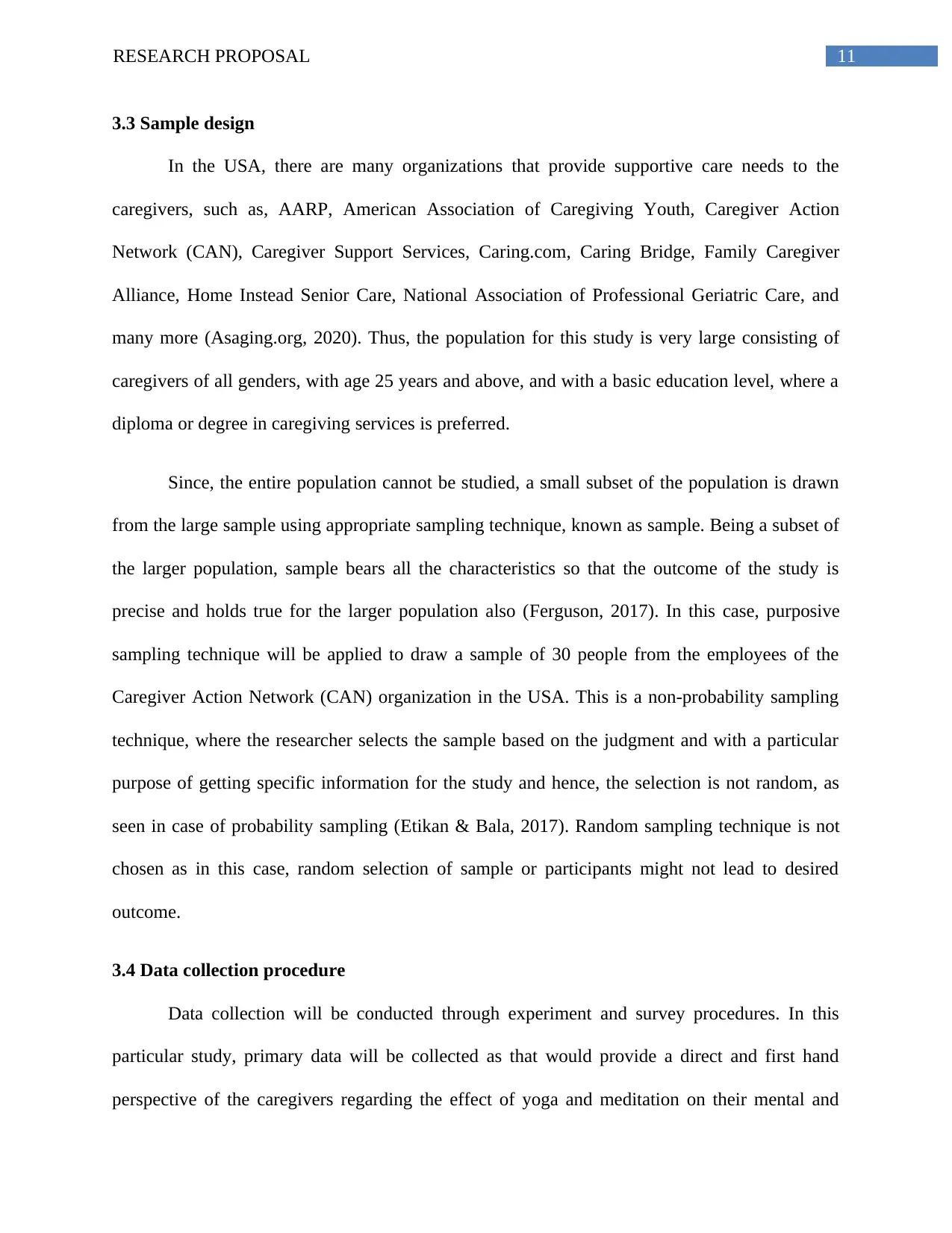
11RESEARCH PROPOSAL
3.3 Sample design
In the USA, there are many organizations that provide supportive care needs to the
caregivers, such as, AARP, American Association of Caregiving Youth, Caregiver Action
Network (CAN), Caregiver Support Services, Caring.com, Caring Bridge, Family Caregiver
Alliance, Home Instead Senior Care, National Association of Professional Geriatric Care, and
many more (Asaging.org, 2020). Thus, the population for this study is very large consisting of
caregivers of all genders, with age 25 years and above, and with a basic education level, where a
diploma or degree in caregiving services is preferred.
Since, the entire population cannot be studied, a small subset of the population is drawn
from the large sample using appropriate sampling technique, known as sample. Being a subset of
the larger population, sample bears all the characteristics so that the outcome of the study is
precise and holds true for the larger population also (Ferguson, 2017). In this case, purposive
sampling technique will be applied to draw a sample of 30 people from the employees of the
Caregiver Action Network (CAN) organization in the USA. This is a non-probability sampling
technique, where the researcher selects the sample based on the judgment and with a particular
purpose of getting specific information for the study and hence, the selection is not random, as
seen in case of probability sampling (Etikan & Bala, 2017). Random sampling technique is not
chosen as in this case, random selection of sample or participants might not lead to desired
outcome.
3.4 Data collection procedure
Data collection will be conducted through experiment and survey procedures. In this
particular study, primary data will be collected as that would provide a direct and first hand
perspective of the caregivers regarding the effect of yoga and meditation on their mental and
3.3 Sample design
In the USA, there are many organizations that provide supportive care needs to the
caregivers, such as, AARP, American Association of Caregiving Youth, Caregiver Action
Network (CAN), Caregiver Support Services, Caring.com, Caring Bridge, Family Caregiver
Alliance, Home Instead Senior Care, National Association of Professional Geriatric Care, and
many more (Asaging.org, 2020). Thus, the population for this study is very large consisting of
caregivers of all genders, with age 25 years and above, and with a basic education level, where a
diploma or degree in caregiving services is preferred.
Since, the entire population cannot be studied, a small subset of the population is drawn
from the large sample using appropriate sampling technique, known as sample. Being a subset of
the larger population, sample bears all the characteristics so that the outcome of the study is
precise and holds true for the larger population also (Ferguson, 2017). In this case, purposive
sampling technique will be applied to draw a sample of 30 people from the employees of the
Caregiver Action Network (CAN) organization in the USA. This is a non-probability sampling
technique, where the researcher selects the sample based on the judgment and with a particular
purpose of getting specific information for the study and hence, the selection is not random, as
seen in case of probability sampling (Etikan & Bala, 2017). Random sampling technique is not
chosen as in this case, random selection of sample or participants might not lead to desired
outcome.
3.4 Data collection procedure
Data collection will be conducted through experiment and survey procedures. In this
particular study, primary data will be collected as that would provide a direct and first hand
perspective of the caregivers regarding the effect of yoga and meditation on their mental and
⊘ This is a preview!⊘
Do you want full access?
Subscribe today to unlock all pages.

Trusted by 1+ million students worldwide
1 out of 18
Related Documents
Your All-in-One AI-Powered Toolkit for Academic Success.
+13062052269
info@desklib.com
Available 24*7 on WhatsApp / Email
![[object Object]](/_next/static/media/star-bottom.7253800d.svg)
Unlock your academic potential
Copyright © 2020–2025 A2Z Services. All Rights Reserved. Developed and managed by ZUCOL.




